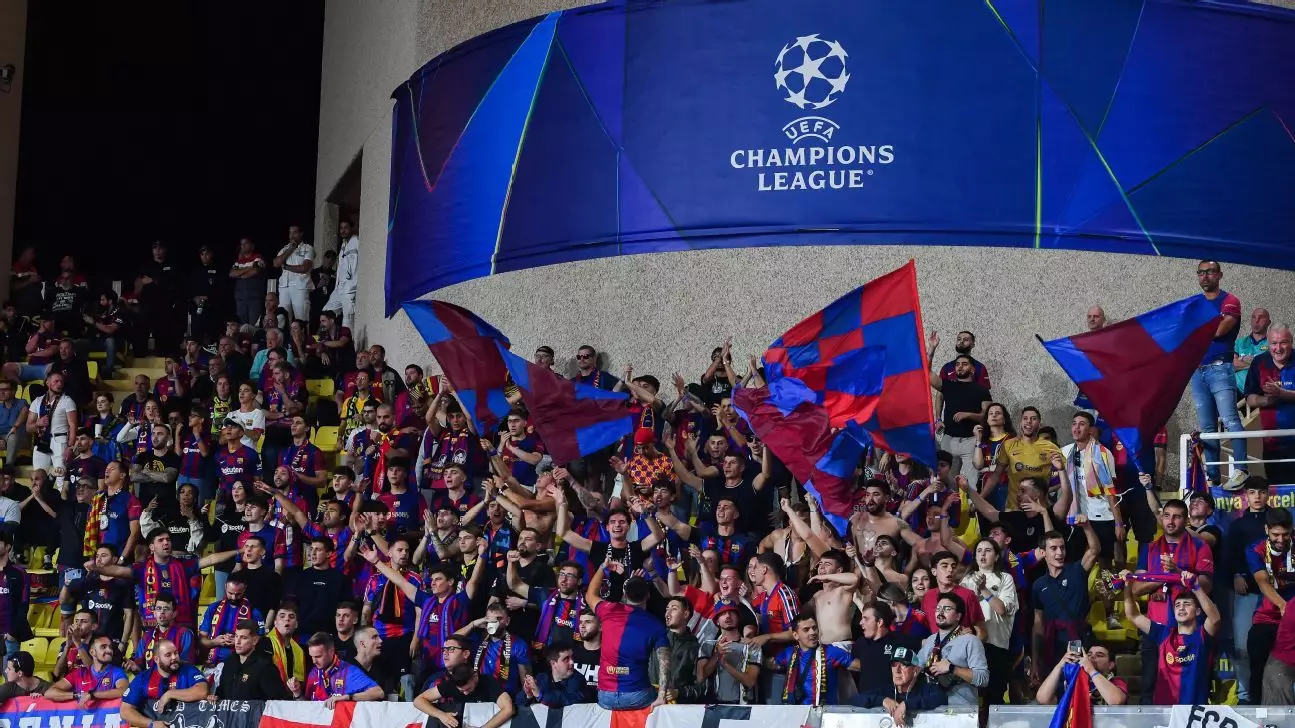In a significant move to combat racism in football, UEFA has imposed a fine of €10,000 (approximately $11,157) on FC Barcelona and banned their fans from attending the club’s next away Champions League fixture. This decision follows an incident during Barcelona’s recent 2-1 loss to AS Monaco, where supporters were found to exhibit unacceptable conduct by displaying Nazi symbols. The upcoming match against Crvena Zvezda, set for November 6 in Belgrade, will take place without Barça’s loyal fanfare. Compounding this matter, UEFA has also suspended Barcelona from selling away tickets for an additional UEFA competition match for a probationary year.
This ruling isn’t an isolated event; it reflects ongoing issues within the football culture surrounding racism and discriminatory behavior. Just last April, Barcelona faced a €25,000 fine due to similar misconduct involving fans engaging in Nazi salutes and racial slurs during a quarterfinal match against Paris Saint-Germain. These persistent issues highlight a troubling pattern where incidents of racism are not just brushed aside but necessitate firm action from governing bodies like UEFA. In light of this, UEFA publicly acknowledged that the sanctions pertain to violations of Article 14(2) of their Disciplinary Regulations, aimed at addressing racist and discriminatory behaviors.
In the wake of UEFA’s decision, FC Barcelona released a statement affirmatively pledging to abide by the sanctions. The club further promised to refund fans who had already purchased tickets for the match against Crvena Zvezda. However, the implications of this incident extend beyond immediate financial penalties; it poses questions about accountability, culture, and the overall responsibility held by clubs regarding their supporters. Barcelona’s vice president, Elena Fort, condemned the behavior of those fans in strong terms, emphasizing that genuine love for the club should not be tainted by such disgraceful actions. Her statement epitomizes the obligation of clubs to foster an environment that disavows racism in any form.
This issue transcends a single match or club; it is symptomatic of a broader environment within football. The persistence of racist symbols and behavior in stadiums underscores a culture that has, for too long, allowed such elements to fester. The club’s acknowledgment of the need for strengthening measures against these behaviors is a commendable step. Still, it raises the question: how effective will these measures truly be? The football community and its governing bodies must collaboratively create a zero-tolerance attitude towards racism, not only processing disciplinary actions but actively promoting awareness and inclusivity.
Looking ahead, there are opportunities for football clubs and organizations to engage with their communities positively. Initiatives that educate fans about diversity, inclusivity, and the impact of racism can lead to a more conscientious sporting culture. Additionally, clubs need to forge stronger ties with anti-racism organizations to promote workshops and community outreach programs. The anti-racism message must go beyond mere statements or posturing; it should be integrated into clubs’ ethos and practices at all levels, fostering a serious commitment to dismantling prejudice in the sport.
The role of coaches and players in addressing this issue is equally significant. Hansi Flick, the head coach of the German national team, remarked on the incident, implicitly highlighting the importance of leadership in confronting such behaviors. Coaches and players can serve as role models by vocally opposing racism, illustrating that it has no place in football or society. Their visibility and influence provide a robust platform for promoting equality and decency, reinforcing to fans and fellow athletes alike that sportsmanship transcends the game.
UEFA’s disciplinary actions against FC Barcelona serve not only as a specific punishment but as a critical reminder of the ongoing battle against racism within football. As clubs face the consequences of their supporters’ actions, the entire football community must take up the mantle of promoting respect, inclusivity, and integrity in the beautiful game. The fight against racism is far from over. It requires vigilance, proactive measures, and a united front to ensure that football can be a safe and welcoming space for everyone.

Leave a Reply